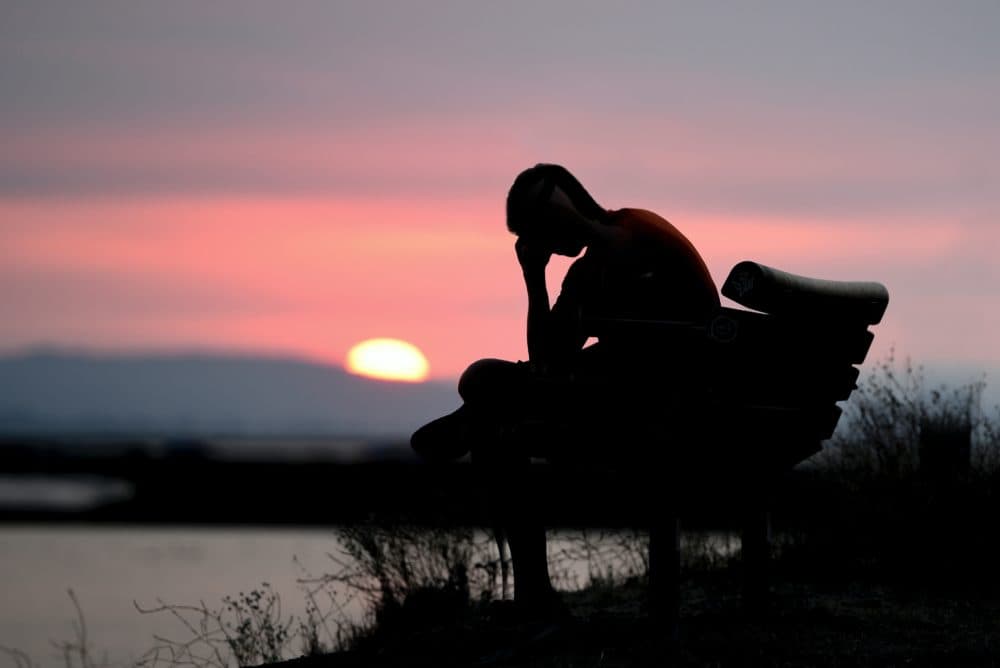Advertisement
Many Americans Experiencing 'More Mental Health Concerns Than Ever Before'

The United Nations is urging leaders to address mental health as the coronavirus pandemic adds to psychological distress around the world.
A recent poll by the Kaiser Family Foundation found 45% of Americans say stress from the pandemic has negatively impacted their mental health. Many people are experiencing more mental health concerns than ever before, says Ken Duckworth, chief medical officer of the National Alliance on Mental Illness (NAMI).
The U.S. saw a record number of suicides in 2017 between overdose deaths and suicide, and the average American life expectancy has been declining over the past several years. Added stress from physical distancing, the threat of unemployment and anxiety that loved ones will get sick is accelerating this pre-existing mental health crisis, he says.
More people are reporting panic attacks, depression and agoraphobia, he says.
“When you're reinforced to stay at home, you can get scared to leave your home,” he says.
People recovering from addiction are also vulnerable, he says, though there isn’t data on this yet. Alcoholics Anonymous, Narcotics Anonymous and other services are available online, but the crisis is still causing added stress for people living in recovery.
This stress is impacting people in different ways, he says: Some people with mental health vulnerabilities may have job security, while some folks experiencing economic issues may develop mental health problems for the first time.
Mental health is an individual experience, he says, but this is everyone’s first pandemic and no one knows when it will end. For the millions of Americans at risk of losing their jobs, Duckworth says data shows unemployment and economic distress correlate with mental health issues, clinical depression and potentially an increased rate of suicide.
“I don't know if somebody I love is going to develop this,” he says, “so the chronic unsettling uncertainty is a reality.”
Advertisement
Lawmakers have been open to covering teletherapy using a computer or a phone for people who don’t own one, he says, which they hadn’t considered covering under Medicare and Medicaid in the past.
The mental health impacts of the pandemic will linger for a long time, and lawmakers need to think of how to best deliver people care using creative policy, he says.
“Every time I look at one of those virus charts, I think about the mental health, post-traumatic impact of people who are losing loved ones, of health care workers who are getting psychologically traumatized, first responders who are exposed to a lot of bad outcomes,” he says.
The cost of not addressing these issues is high. Untreated mental health conditions can lead to suicide and overdose, he says.
There’s also a hidden cost when it comes to medical care. Untreated depression can impact the heart and makes it more difficult to control diabetes, while panic attacks can impact cancer patients’ ability to receive treatment, he says.
Mental health issues also make it harder for people to parent, sustain a romantic relationship and contribute to their community, he says. Duckworth recommends taking this moment to reflect on how many other people are also struggling with mental health issues.
“Realize that this is a common condition, that many people live with mental health problems and we need to treat them the same [as physical health issues],” he says. “And we need to eliminate the shame.”
NAMI is running ads with the message, “It’s OK not to be OK,” because Duckworth says people are socialized into saying they’re doing well even when that’s not the case.
No matter what you’re experiencing during this pandemic — whether you’re an introvert secretly enjoying social distancing or if you need help accessing care for a recurrence of bipolar disorder — Duckworth says that’s OK. Don’t worry alone and reach out for help.
Though he predicts the mental health impact of the pandemic will stay with us for some time, Duckworth sees one “silver lining.”
“I think people who haven't had a mental health condition before may have increased empathy and sensitivity for what it's like to live with a mental health condition going forward,” he says. “And I have heard that comment from more than one person: ‘I know what this is like now in a way that I didn't before because I'm now having panic attacks.’ ”
If you or someone you know may be considering suicide, contact the National Suicide Prevention Lifeline at 1-800-273-8255 (En Español: 1-888-628-9454; Deaf and Hard of Hearing: 1-800-799-4889) or the Crisis Text Line by texting 741741.
Ashley Locke produced and edited this interview for broadcast with Tinku Ray. Allison Hagan adapted it for the web.
This segment aired on May 14, 2020.

